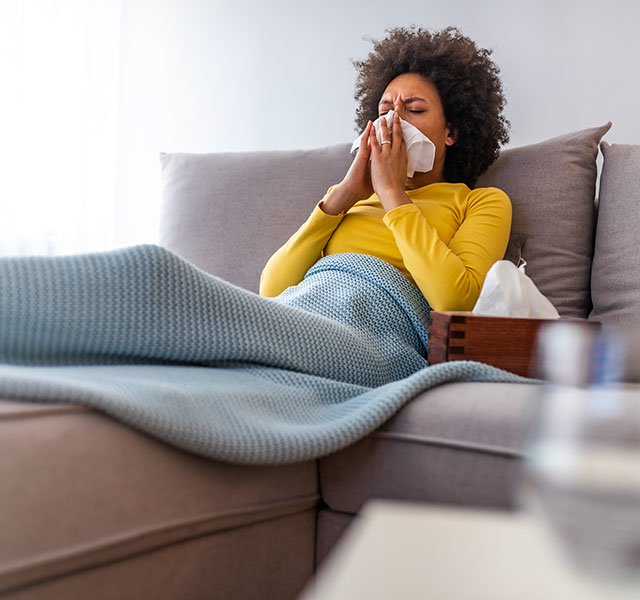The first human case of COVID-19 appeared in Wuhan, China, in December 2019. Four months later, the novel respiratory virus has spread worldwide. It's highly contagious and replicates quickly.
"For every person infected with the flu, one-and-a-half additional people become infected," says Marcus Zervos, M.D., an infectious disease specialist with Henry Ford Health. "For every person infected with COVID-19, three or four additional people become infected. This virus has mutated since it first appeared in China, possibly causing it to be even more contagious in places like Italy and the United States."
People who contract COVID-19 experience varying degrees of symptoms. Some show no symptoms at all while others feel sick and lethargic, and still others experience life-threatening situations. This is not entirely known why, and experts are learning more about the virus each day. What they do know, however, is what COVID-19 does to your body.
Here, we break it down with the help of Dr. Zervos and Frank McGeorge, M.D., an emergency medicine physician with Henry Ford Health and Local 4 WDIV health correspondent.
How Does COVID-19 Get Into Your Body?
When a person infected with COVID-19 coughs or sneezes, they emit respiratory droplets that can travel to a nearby person and enter via their mouth, eyes or nose, says Dr. Zervos. These particles have spiked proteins that attach themselves to the cells covering the lining of the eyes, nose, mouth and throat. (Corona translates to crown in Latin, and the virus vaguely resembles a spiked crown, hence the name coronavirus.) There, they set up shop and hijack your cells to make more virus, which then spreads to adjacent cells.
This is how all viruses work, says Dr. McGeorge. But other coronaviruses, like the ones that produce the common cold, stop in your nose or throat, and that's why you'll just get a runny nose or sore throat. In many people with COVID-19, this is also where the story ends: their bodies successfully defend themselves and they experience a mild illness. Some people also experience a loss of smell and dullened taste buds, which is likely because the virus affects the olfactory nerves and tongue that carry those senses, he adds.
What's Happening In Your Body When COVID-19 Gets Worse?
In at least 20% of infected people, the virus moves lower into the respiratory tract, and that's when you could experience irritation and a dry cough, says Dr. McGeorge. In many people, the illness stops there. But if the virus makes it further down into your lungs--all the while hijacking cells to reproduce itself--it can cause inflammation leading to serious conditions like pneumonia and Acute Respiratory Distress Syndrome (ARDS), where the lungs stiffen and fill with fluid.
The lungs are unable to absorb oxygen properly, leading to shortness of breath and, in severe cases, respiratory failure. That's when a breathing tube and ventilator are needed--they breathe for you using higher concentrations of oxygen and pressure to overcome stiffening and fluid buildup in the lungs.
Why Do Some People Experience More Complications From The Virus Than Others?
It's not entirely known, but we do know that those with underlying conditions--heart problems and diabetes, for example--tend to have worse outcomes, says Dr. Zervos. When someone contracts the virus, their immune system is activated to fight off the virus. (That's why you might get a fever or body aches--both occur when the body's immune system releases special proteins to heal itself.)
Sometimes, however, levels of those special proteins go high enough that they create intense inflammation in the body, causing collateral damage to other organs like the heart and kidneys, Dr. Zervos explains. The heart, which is heavily involved in immune system response, can become compromised, which is why those with underlying conditions tend to have worse outcomes, Dr. McGeorge adds.
When people experience complications from COVID-19, it's often because their immune systems have become over-activated. The reason why, however, two equally healthy people can contract the virus and experience varying levels of symptoms is still being researched, Dr. Zervos says, and it's thought that the overwhelming majority of COVID-19 cases (about 85%) experience mild symptoms.
Check out Dr. McGeorge's segment with Local 4 WDIV:
If you're experiencing symptoms and are concerned about possibly having COVID-19, use this online screening tool to help you learn more about your risk and get recommended next steps.
For up-to-date information about Henry Ford Health's response to the coronavirus, visit henryford.com/coronavirus
Dr. Marcus Zervos is a doctor specializing in infectious disease and sees patients at Henry Ford Hospital in Detroit and Henry Ford West Bloomfield Hospital.
Dr. Frank McGeorge is an emergency room doctor at Henry Ford Hospital in Detroit. He also serves as health correspondent for Local 4 WDIV.



